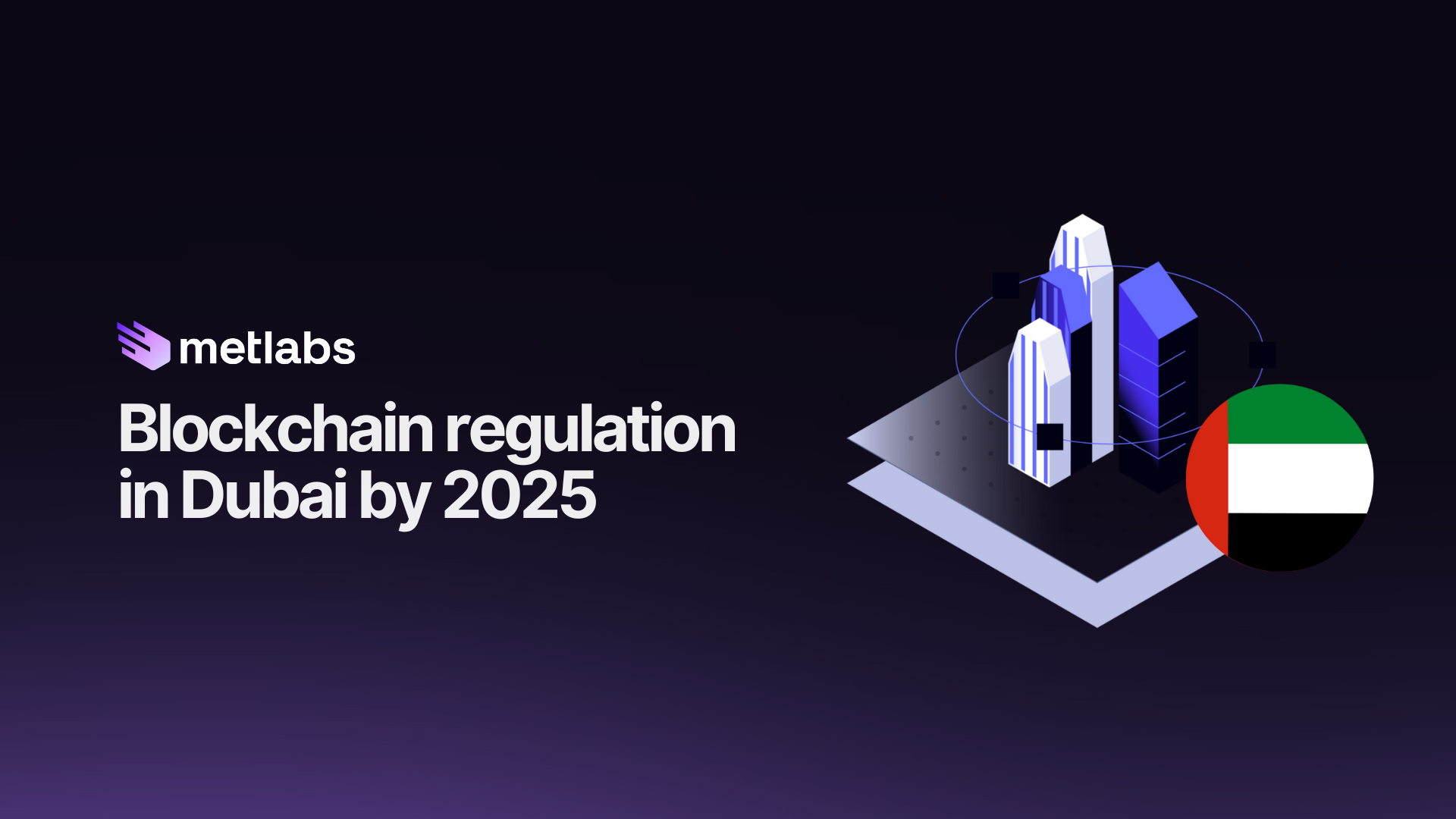The adoption of blockchain technology and asset tokenization is advancing at a rapid pace, but the real engine driving its global development is the existence of a clear, consistent and innovation-friendly legal framework.
Some countries have already established themselves as regulatory benchmarks, establishing specific rules for cryptoassets, DLT infrastructures and token issuance with legal backing. In this article we show you the information relevant to blockchain regulation in Dubai, which you can use as a guide if you are looking to operate internationally or evaluate different strategic locations.

Current legislation on blockchain and virtual assets in Dubai
Act No. 4 of 2022 (VARA)
Law No. 4 of 2022 established the Virtual Assets Regulatory Authority as the exclusive regulator for virtual assets in Dubai, excluding free zones such as the DIFC. The law requires all VASPs to obtain specific licenses for each activity: custody, exchange, lending, payment services, among others. It also imposes AML/KYC rules, capital requirements and strict supervision of providers’ activities.
Cryptoassets Activities Regulations, CAAR (SCA, 2020)
Applies at the federal level outside of free zones such as ADGM and DIFC, regulating the offer, issuance and custody of cryptoassets. Requires SCA licensing, periodic audits and suspicious transaction reporting. Aligns with FATF AML/CFT guidelines and imposes sanctions for market abuse. Establishes minimum capital requirements for exchanges. Also requires business continuity plans and investor protection measures.
VARA Rulebook 2023
This Rulebook, published in 2023, details the requirements for each type of virtual asset activity. It defines disclosure obligations, custody standards, cybersecurity, consumer protection and risk management. It includes special provisions for exchanges and lending platforms, as well as limitations on the use of privacy tokens and anonymous currencies.
CBUAE Circular 2/2024 on stablecoins
Central Bank Circular 2/2024 (CBUAE) establishes mandatory requirements for AED-backed stablecoins. They must be 1:1 dirham-backed, specifically licensed and subject to regular audits. Algorithmic or foreign currency-backed stablecoins cannot be legally offered in Dubai.
RWA Tokenization Guidelines (2025)
In 2025, it published new guidelines for the tokenization of real assets (RWA), such as real estate and commodities. These rules regulate the issuance, listing and trading of RWA tokens, establishing requirements for transparency, ownership validation, liquidity reserves and risk disclosure. In addition, they require technological standards for the use of DLTs in the issuance and trading of these tokens.
Sandboxes and special economic zones in Dubai
VARA, ADGM, DIFC and RAK DAO operate sandboxes that allow testing blockchain and Web3 technologies. They offer a flexible regulatory framework of up to 18 months for pilots, such as the Central Bank’s CBDC. These zones provide tax incentives and access to supervised venture capital. They have attracted international real asset tokenization projects. They also collaborate with global bodies to harmonize regulations and technical standards.
Tokenization makes it possible to digitally represent real-world assets through blockchain, but for it to have legal value, it is essential that there is a regulatory framework that recognizes this operation. Dubai adopts its own approach, establishing specific rules for the issuance, custody or trading of tokens. In this block we explain how asset tokenization is regulated from a legal point of view, taking an advanced jurisdiction such as Dubai as an example.
Regulation of asset tokenization in Dubai
Asset tokenization in Dubai is among the most advanced on the planet, thanks to the legal framework developed by the various agencies. Tokens representing securities or financial instruments are subject to the guidelines and requirements of the Rulebook, which regulate their issuance, custody and secondary trading.
In the field of real assets, the Dubai Land Department (DLD) is leading initiatives for real estate tokenization, with pilots that integrate blockchain property registries and smart contracts for sale and purchase. In addition, the Dubai Blockchain Strategy, coordinated by the Dubai Digital Authority (DDA), establishes guidelines for interoperability between public registries and blockchain solutions, favoring tokenization in sectors such as real estate, energy, art and logistics.
Tokenized transactions have legal recognition, and blockchain records are valid to prove ownership rights. The DIFC, through the DFSA, provides a complementary framework for structuring tokenized funds and collective investment vehicles based on digital assets, attracting family offices and institutional investors. In parallel, the sandbox allows new tokenization models to be tested before full commercialization. In 2025, Dubai has consolidated its position as a global hub for real asset tokenization (RWA) projects, thanks to a pro-innovation legal environment, clear compliance standards and the backing of local authorities.
Digital asset regulatory bodies and authorities in Dubai
VARA
Virtual Assets Regulatory Authority is the exclusive regulator of virtual assets in Dubai (except DIFC). It was established by Law No. 4 of 2022 and regulates all activities related to digital assets: exchanges, custodians, issuers, DeFi platforms, stablecoins and tokenization of real assets. It oversees VASP licensing, imposes transparency and investor protection rules, and updates its Rulebook in line with trends.
Dubai Land Department (DLD)
The DLD regulates the registration of real estate properties in Dubai and leads the industry’s tokenization initiatives. It has developed blockchain-based solutions to register property rights, issue tokens representing real estate and facilitate secure transactions in the real estate market. He coordinates with the Virtual Assets Regulatory Authority and the Dubai Digital Authority on these projects.
Dubai Digital Authority (DDA)
The DDA leads the Dubai Government’s digital strategy and oversees the implementation of the Dubai Blockchain Strategy. It sets the technology and interoperability standards for blockchain records in sectors such as property, education, health and commerce. His role is key in the integration of tokenized solutions with Dubai’s official records and digital infrastructure.
Dubai Financial Services Authority (DFSA)
DFSA regulates financial services and digital assets within the Dubai International Financial Centre (DIFC). It issues licenses for exchanges, custodians and tokenized funds. It oversees governance standards, investor protection and AML compliance. Its framework is widely used to structure institutional funds that invest in RWA tokens.
Central Bank of the UAE (CBUAE)
The CBUAE regulates AED-backed stablecoins and leads the implementation of the national CBDC. It oversees the issuance of payment tokens, requires 1:1 reserve backing and sets prudential requirements for issuers. It also collaborates with the Virtual Assets Regulatory Authority to maintain regulatory consistency across the UAE’s financial ecosystem.
Crypto Task Forces (Dubai Police, Emirates NFSCC)
Dubai has joint task forces specialized in crypto-asset related crimes, led by the Dubai Police Cyber Crime Department and the Emirates NFSCC, in collaboration with the Virtual Assets Regulatory Authority and the CBUAE. These units investigate fraud, money laundering and cybercrime linked to digital assets.
Launching a business based on digital assets requires more than just technology: it is also necessary to comply with legal requirements such as licensing, registration and regulatory obligations. These conditions ensure that the business model is viable and sustainable over time, and that it meets transparency and fraud prevention standards. In this section we explore what licenses are typically required and what compliance criteria blockchain companies operating in Dubai must follow.

What licenses and requirements are needed to trade cryptoassets in Dubai?
VARA License
Any company operating outside of DIFC offering services with virtual assets must obtain a VASP license issued by VARA. This license covers exchange, custody, token issuance, DeFi services and advisory services. It requires demonstrating solvency, effective governance, AML/KYC compliance and consumer protection.
DIFC License (DFSA)
Entities operating in the DIFC need a license issued by the DFSA. This is essential for exchanges, custodians, tokenized funds and investment structures with digital assets. The DFSA license requires compliance with high standards of international financial regulation, transparency and cybersecurity.
License for stablecoins (CBUAE)
The issuance of AED-backed stablecoins requires a specific license granted by the CBUAE. The issuer must maintain reserves in AED in a 1:1 ratio, comply with liquidity, solvency and periodic reporting requirements. Stablecoins not backed by AED cannot be legally offered as a means of payment.
AML/KYC Compliance
All companies licensed by the Virtual Assets Regulatory Authority, DFSA or CBUAE must comply with AML/KYC obligations derived from FATF standards and UAE federal regulations. This includes customer identification, transaction monitoring, suspicious activity reporting and cooperation with competent authorities.
Are you exploring developing your blockchain project in Dubai?
At Metlabs we help companies like yours and offer comprehensive support in the development of blockchain projects and tokenization of assets such as real estate, carbon credits, commodities, intellectual property, financial instruments, franchises and more, fully aligned with blockchain regulation in Dubai and international regulatory standards.
Contact us and find out how we can help you meeting all your business model needs, from technical validation and structuring to design, development and implementation of custom blockchain solutions, ready to scale from day one.



